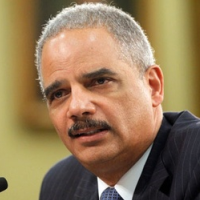Holder Deadline for Prosecuting Wall Street Executives for Financial Crisis Passes without a Single Charge
 Eric Holder (photo: Molly Riley, AP)
Eric Holder (photo: Molly Riley, AP)
Shortly before Attorney General Eric Holder left office, he gave his prosecutors 90 days to decide whether to indict any Wall Street executives for decisions that caused the 2008 financial crisis.
Holder has now left the building at the Department of Justice (DOJ). Also gone is his deadline for punishing big bankers, none of whom were charged with a crime.
Holder’s shop had six years to build cases against key people at institutions like Citigroup and JP Morgan Chase. It’s not known if prosecutors ever did that. What is known is that the only charges actually filed by DOJ lawyers have been against smaller fish, namely those working at small and medium sized banks, according the Center for Public Integrity (CPI).
The investigative news site reviewed enforcement actions and civil lawsuits filed by the Justice Department, Federal Deposit Insurance Corp. (FDIC) and Securities and Exchange Commission (SEC) and found “these agencies have been far more likely to charge or sue individuals who work at small and medium sized banks, and foreign financial firms, than those that work at domestic banking giants such as J.P. Morgan Chase & Co. or Citigroup.”
CPI’s Alison Fitzgerald reported that none of the five largest banks in the country are involved in criminal cases filed by the Justice Department that pertain to the financial crisis.
“Two defendants who were unsuccessfully prosecuted ran a hedge fund for the now-defunct investment bank Bear Stearns,” she wrote. “About a dozen others are from smaller banks or foreign institutions.”
At the SEC, only four of the more than 100 bank executives named in lawsuits were from the top five banks, according to Fitzgerald. The FDIC has sued nearly 2,000 bank executives, none of whom worked at any of the big Wall Street banks.
“There’s no question that these banks have admitted that they’ve violated laws and regulations,” Independent Community Banker of America CEO Camden Fine told CPI. “These guys on Wall Street get their checkbooks out and write a check. This is an issue of unequal enforcement.”
For his part, Holder recently defended his efforts and that of the DOJ to prosecute individuals at the big banks for criminal wrongdoing. “To the extent that individuals have not been prosecuted, people should understand it is not for lack of trying,” he said.
“Nonsense,” countered former U.S. Assistant Attorney General Jimmy Gurulé. “Charges for white-collar crimes are filed every single day by U.S. attorneys across the country,” he told International Business Times. “Just because they’re more difficult with banks is not a legitimate excuse for bringing zero charges against individuals.”
-Noel Brinkerhoff, Danny Biederman
To Learn More:
Bankers From Major Institutions Still Haven't Been Held Responsible For Financial Crash (by Alison Fitzgerald, Center for Public Integrity)
Who Caused The Financial Crisis? Prosecutors Face 3-Month Deadline for Bringing Charges in the Subprime Mortgage Mess (by Owen Davis, International Business Times)
Instead of Wall St. Prosecutions, Holder Delivers a Deadline (by William Cohan, New York Times)
Eric Holder’s Last Chance to Prosecute Financial Meltdown Bankers (by Noel Brinkerhoff, AllGov)
- Top Stories
- Unusual News
- Where is the Money Going?
- Controversies
- U.S. and the World
- Appointments and Resignations
- Latest News
- What If China Invaded the United States?
- Donald Trump Has a Mental Health Problem and It Has a Name
- Trump Goes on Renaming Frenzy
- Trump Deports JD Vance and His Wife
- Trump Offers to Return Alaska to Russia






Comments